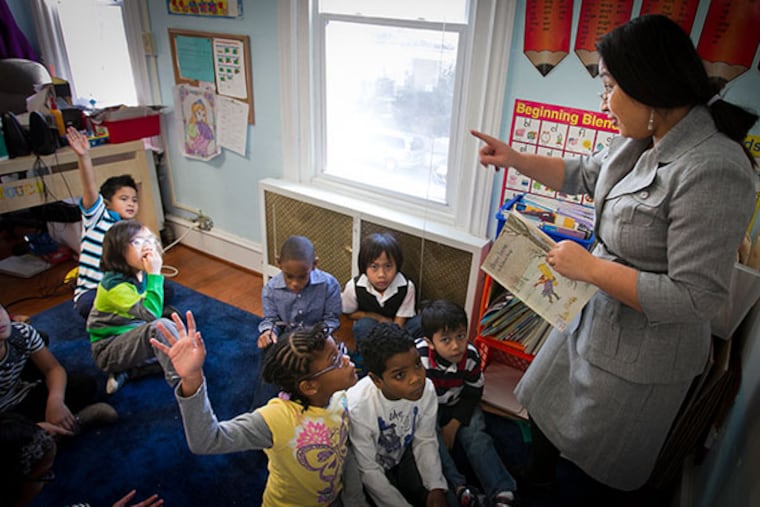School serves Cambodian refugee families
LOGAN Hope offers small classes, more attention and understanding.

IN A THREE-STORY, gray-stone and white house in Logan, Savorn Touch teaches 11 first-graders. Most are Cambodian-Americans whose parents or grandparents came to the U.S. as refugees.
Touch was 8 years old in 1984 when her family resettled in Philadelphia after fleeing Khmer Rouge soldiers during the murderous reign of dictator Pol Pot.
Her father and 4-month-old sister died of starvation in the late 1970s during this period, known as "the Killing Fields." Before coming to the U.S., Touch spent several years in a refugee camp at the Cambodia-Thailand border.
Now, Touch, 37, is able to relate to students at LOGAN Hope School whose families have faced similar trauma. She has enrolled two of her own kids in the small, private Christian K-8 school on 13th Street near Ruscomb.
The school opened in 2002, the vision of Ken and Anita MacBain, who saw that many kids from Cambodian refugee families in the Logan and Olney neighborhoods were not learning well in the public school system, or were frequently missing classes.
LOGAN Hope - LOGAN stands for Loving Our God And Neighbor - is the only school in the city set up primarily to serve Cambodian refugee families, and only one of two Ken knows of in the nation.
LOGAN Hope started with 17 students, all Cambodian. Now, the school has 79, about 60 percent of whom are of Cambodian descent, and another 10 percent of whom are multiracial, mostly of Cambodian and African-American descent. The rest of the student body is black, white or of other mixed ethnicities.
The MacBains live across the street from the school. "We're not these experts that come from somewhere else and leave at the end of the day," said Ken.
They also adopted two girls from Cambodia, Sothea and Sony, in 2004 and 2005, respectively. Both girls graduated from the school last year. The couple's biological son, Joshua, is a seventh-grader at LOGAN Hope.
A new solution
The MacBains were first sent by a church in Wayne to live in Logan in the early 1990s to help a Cambodian church in the neighborhood grow. Through a Bible club and other activities, they got to know the Cambodian kids.
"There was a time when we said, 'School's not working for a lot of these kids,' " said Ken, executive director of LOGAN Hope. "More so with the boys, that they'd be shy and they'd hang out in the back of the class. They wouldn't learn how to read."
They found that some middle-school students had family members who were connected to gangs. And some kids didn't have much supervision because their parents were working all day.
"A whole lot of life was going on without parental involvement or understanding," said Ken, 56.
In the beginning, the couple faced challenges. Anita, 54, the school's principal, recalled the story of one grandmother who yelled at her granddaughter, calling her "lazy" because the girl was reading a book. In Cambodia, "if you're active, you're working, growing things" on the land, Anita said about the upbringing the grandmother had.
Pouv Tong and his wife, Vocheata Dam, have a daughter, Donna Tong, in first grade at the school. They also plan to enroll Sophia, 4, in kindergarten there.
The father was about 12 when his family resettled here in 1982 as Cambodian refugees. He attended Philly public schools, but found it tough as a newcomer.
"You go to fight almost every day," said Tong, 43. "It's hard to get an education when you worry about people bullying you."
LOGAN Hope is a safe place for Donna, he said. "They look after the kids." He also likes that the school's first- and second-grade teachers (and its former kindergarten teacher) can speak the Cambodian language, Khmer.
Mia-lia Kiernan, an organizer with the One Love Movement, a group that fights the deportation of Cambodian refugees, said of the MacBains: "I think they are incredibly compassionate people who saw a need in the community they live in, and they wanted to provide a service that is very valuable."
The MacBains are hoping to move the school into another building on Ruscomb Street, near 13th, which they bought at a sheriff's sale. They have gutted the former 14-unit apartment building and now need someone to help raise funds to renovate it.
The school obtains about 60 percent of its funding from companies through the state tax-credit program, Ken said. It also receives donations from individuals and foundations. Annual tuition is $7,200, but with scholarships and financial aid, low-income families pay much less.
"You feel like family here, more than just a school," said Touch, the first-grade teacher. She enrolled her two boys, Nathaniel and Philip, at LOGAN Hope "because it's a smaller environment. Most Cambodians are very shy. Because of the smaller environment, they're more open."